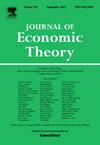揭示互惠
IF 1.2
3区 经济学
Q3 ECONOMICS
引用次数: 0
摘要
我们在情境依赖选择的框架下提出并描述了一般互惠模型。在该模型中,后发者可以建立自己的规则,决定何时或为何进行回报。该模型将基线社会偏好与互惠分离开来:互惠发生在人们由于先发者的选择所处的环境而偏离其基线偏好时。我们的模型提供了一个揭示互惠的条件,这与在实验环境中通常用于识别互惠的标准无模型标准一致。因此,它使我们能够通过我们的模型的镜头来检查这个标准的行为基础。此外,在某些情况下,由于数据不完善,标准标准无法适用,我们的模型通过对后发者的心理过程施加假设,提供了一个额外的条件来揭示互惠性。最后,我们将该模型应用于过去的几个实验,展示了它如何识别互惠。本文章由计算机程序翻译,如有差异,请以英文原文为准。
Revealed reciprocity
We propose and characterize the General Reciprocity Model in a framework of context-dependent choice. In the model, the second mover can establish their own rules regarding when or why to reciprocate. The model disentangles the baseline social preference from reciprocity: reciprocity occurs when people deviate from their baseline preference due to the context in which the first mover's choice is made. Our model provides a condition to reveal reciprocity, which aligns with the standard model-free criterion commonly used to identify reciprocity in experimental settings. Thus, it enables us to examine the behavioral foundation of this criterion through the lens of our model. Moreover, in some situations where the standard criterion cannot be applied due to imperfect data, our model offers an additional condition to reveal reciprocity by imposing assumptions about the second mover's psychological processes. Finally, we apply the model to several past experiments, demonstrating how it identifies reciprocity.
求助全文
通过发布文献求助,成功后即可免费获取论文全文。
去求助
来源期刊

Journal of Economic Theory
ECONOMICS-
CiteScore
2.50
自引率
12.50%
发文量
135
期刊介绍:
The Journal of Economic Theory publishes original research on economic theory and emphasizes the theoretical analysis of economic models, including the study of related mathematical techniques. JET is the leading journal in economic theory. It is also one of nine core journals in all of economics. Among these journals, the Journal of Economic Theory ranks fourth in impact-adjusted citations.
 求助内容:
求助内容: 应助结果提醒方式:
应助结果提醒方式:


